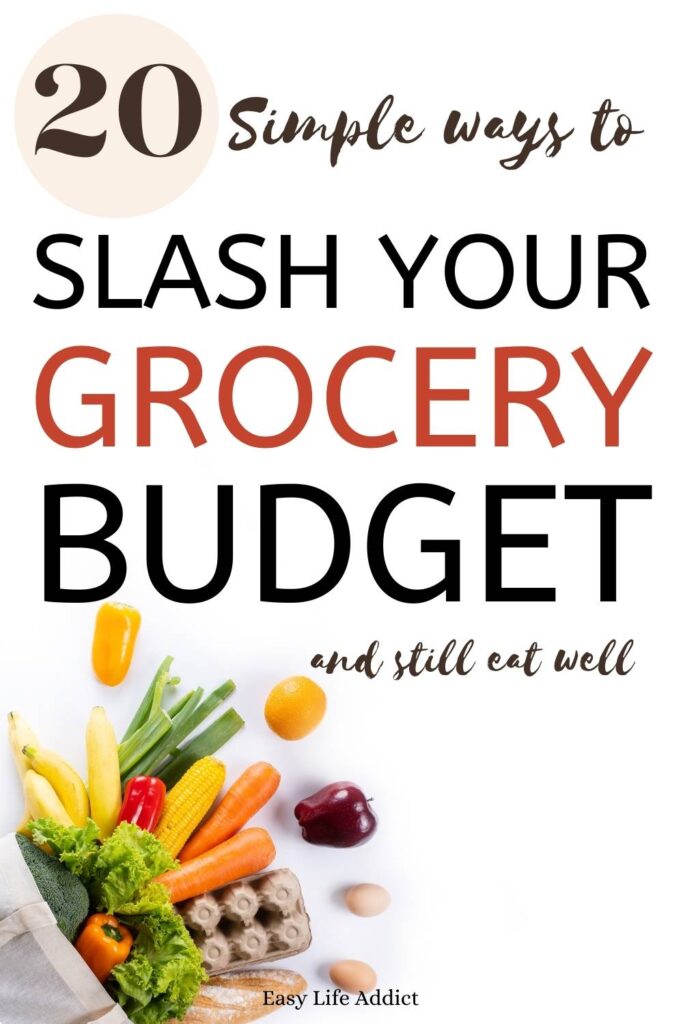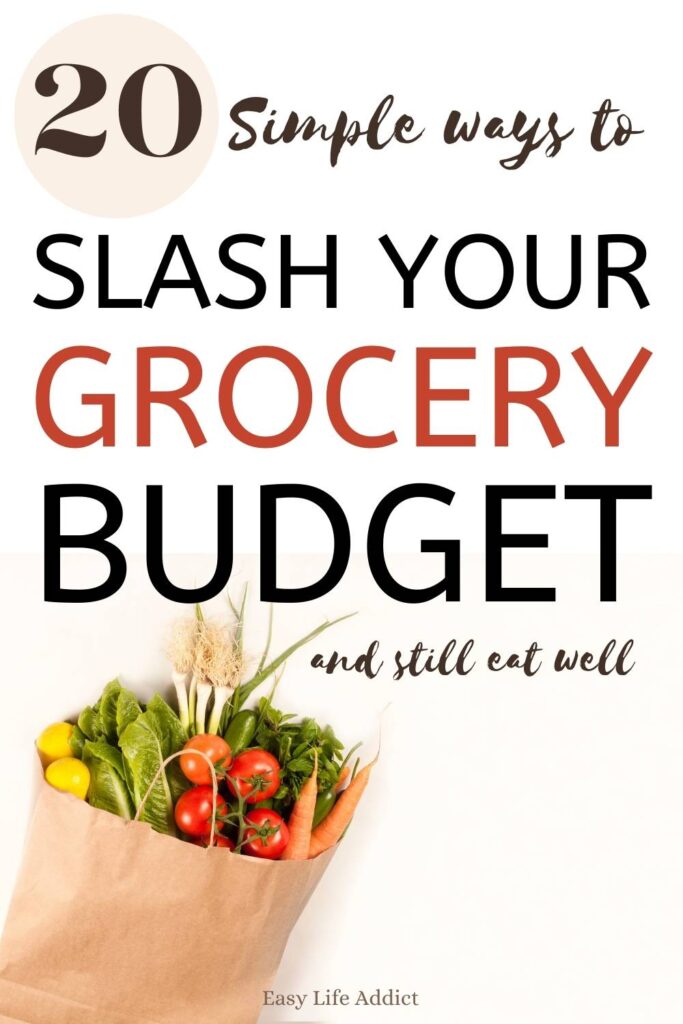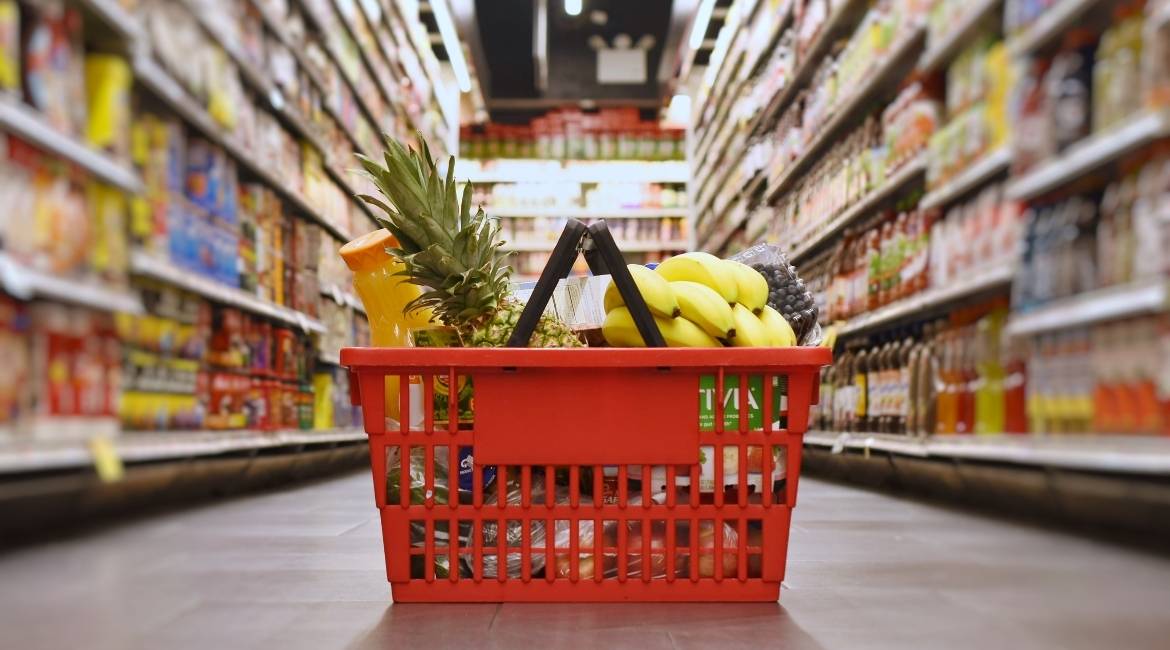20 Simple Ways to Save Money on Groceries!
Grocery costs can significantly drain your finances, but there are plenty of ways to save money on groceries. In this post, we’ll share 20 tips to help you reduce your grocery bill. Whether you’re looking to save money on your weekly grocery shop or want to cut costs for a special occasion, these tips will help you!
This post may contain affiliate links. That means that if you click on a link and purchase something I recommend, I will receive a small commission at no extra cost to you. As an Amazon Associate, I earn from qualifying purchases. This helps keep my website up and running and is very appreciated. Thank you for your support! You can read my full disclosure policy here.
How Much do People Spend on Groceries Each Month?
For many people, the cost of groceries is one of the most significant monthly expenses. According to NimbleFins, analysis of data from the Office of National Statistics shows the average UK household now spends around £3601 a year on food, that’s a whopping £300 a month.
However, with the current cost-of-living crisis, these costs are set to rise dramatically in the coming months! Of course, this figure varies widely depending on factors such as the size of the household, dietary preferences, and whether or not you eat out often.
Finding ways to save on groceries can be a real challenge for those on a tight budget. However, a few simple tips can help you trim down your bill.
Read more: 18 Simple tips to save money and boost your budget!
20 Simple Ways to Save Money on Groceries:

1. Helpful Shopping Apps:
If you’re looking to save money on groceries, shopping apps can be a big help. By comparing prices from different stores and finding coupons and deals, shopping apps can help you ensure you’re getting the best possible price on your groceries.
They can also help you keep track of what you have in your pantry and fridge so you don’t buy things you already have. And if you’re short on time, shopping apps can also help you plan your shopping trip so you can get in and out of the store quickly. So, if you’re looking to save some money on your grocery bill, be sure to check out some apps.
Some of the best-rated grocery apps and websites include:
Flip – This essential app brings you the latest weekly ads, deals, and coupons from over 2000 of your favourite stores. (USA)
Coupon.com – Wherever you shop, use the cashback offers to earn real money. Just get itemised receipts or link your loyalty cards. (USA)
Latest Deals – Find the cheapest groceries, save money on your shopping and see the best prices. (UK)
Too Good To Go – Every day, delicious, fresh food goes to waste at cafes, restaurants, hotels, shops and manufacturers. The Too Good To Go app lets customers buy and collect this food directly from businesses at a great price.
2. Shop Online
One of my favourite ways of saving money on grocery shopping is to shop online. Here’s why:
For starters, when you shop online, you can take advantage of coupons and promo codes that you wouldn’t be able to use if you were shopping in-store. Online stores often offer discounts that brick-and-mortar stores can’t match. Furthermore, many online grocers provide free shipping on orders over a certain amount, meaning you also save on petrol.
So next time you need to stock up on groceries, save yourself some time and money by shopping online. You may be surprised at how much money you save!
3. Grocery Store Loyalty Cards
Do you use loyalty cards when you go grocery shopping? If not, you could be missing out on some serious savings.
Loyalty cards are free to sign up for, and most grocery stores offer them nowadays. Present your card at checkout, and you’ll start accruing points that can be redeemed for discounts on future purchases.
The more you shop at a particular store, the more points you’ll rack up, and the more significant the discounts will be. In addition, many stores offer loyalty card holders exclusive coupons and deals that non-holders cannot access. So, if you’re not using a loyalty card when you grocery shop, you’re leaving money on the table. Sign up for a loyalty card today and start reaping the rewards!
4. Try Different Grocery Stores
Many people assume it’s cheaper to shop at a big supermarket for groceries. But in my experience, that’s not always the case.
I like to mix and match where I buy different items because it often leads to big savings. For example, I might buy meat and produce from the farmer’s market, dry goods from a supermarket, and household items from a discount store.
By shopping around, you can get the best price on each item. It does, however, take a bit more effort than just going to one store, but it’s worth it for the savings in the end. So, if you want to save money on your food bill, I suggest trying this method. You might be surprised at how much you can save!
5. Don’t Shop When You’re Hungry

Anyone who has ever gone grocery shopping on an empty stomach can attest that it’s not a good idea.
When you’re hungry, your senses are heightened, and you’re more likely to impulse buy. You’re also more likely to make poor choices, like choosing unhealthy comfort foods or buying too much food. And let’s be honest, grocery shopping is not an enjoyable experience when you’re hungry. You’ll likely be cranky and snap at the cashier and fellow shoppers.
So, next time you go grocery shopping, make sure you’re not hungry. Your wallet (and your waistline) will thank you.
6. Pay in Cash
If you want to save money on food shopping, one simple trick is to pay in cash instead of using a credit or debit card. When you use cash, you’re much more likely to stick to your budget since you can physically see how much money you have to spend.
Studies have shown that people spend less when using cash instead of plastic, so if saving money is your goal, ditching the cards and opting for cash is smart. Another advantage of paying in cash is that it’s easier to resist impulse buys. When standing in front of the candy aisle with a wad of cash in your hand, it’s much easier to say no than when you’ve got a credit card burning a hole in your pocket.
7. Know When to Shop
Grocery shopping can be a budget buster if you’re not careful. But there are ways to save money, and one of the best is to shop on certain days and times. For example, stores often mark down meat on Mondays to eliminate products sitting over the weekend. So, planning your meals around what’s on sale can save a lot of money.
Similarly, produce is often marked down at the end of the day, so shopping later in the afternoon can help you snag some bargains. If you’re flexible about when you shop, you can take advantage of special deals that stores offer at different times throughout the week. So, planning before you hit the grocery store can help you stay within your budget.
8. Think Before Buying in Bulk
Most people think buying bulk is the best way to save money on food shopping. After all, you get more for your money when you buy in bulk, right? Wrong.
While it’s true that you get more bang for your buck when you buy in bulk, there are a few things you need to consider before you head to the store and stock up. First, do you have enough storage space for all those bulk items? If not, they’ll take up space in your home and go to waste.
Second, will you use all of the food before it goes bad? That cereal box might be a great deal, but if you only eat cereal once a week, it will have gone stale by the time you finish it.
Lastly, Bulk items often have a higher price tag than their non-bulk counterparts. So before you buy in bulk, ask yourself if it’s worth it. You might be better off sticking to smaller amounts of food you know you’ll use.
9. Plan Meals Around Sale Items
One simple way to reduce your food budget is to plan your meals around sale items. For example, if it’s chicken on sale this week, you could make chicken stir-fry, chicken soup, or chicken fajitas. You can stretch your food budget by taking advantage of sales and still enjoy delicious, healthy meals.
In addition, planning can help you avoid last-minute trips to the grocery store, which can be expensive. So next time you want to save money on groceries, remember to plan your meals around sale items. It’s a simple way to slash your food budget without sacrificing taste or nutrition.
10. Start Freezing and Storing Meals
If you’re like most people, the weekdays are a mad dash to get out the door on time, with little time left over for cooking. As a result, you may find yourself eating out more often than you’d like, which can quickly add up.
One way to save money and time is to batch-cook meals and freeze them later. By cooking a large batch of food at once, you can make enough to last for several meals. And by freezing the extra servings, you can enjoy a home-cooked meal any night of the week without starting from scratch.
Not only will this save you money, but it will also give you the peace of mind of knowing there’s always a healthy meal in the freezer.
11. Make a List and Stick to it
It’s happened to all of us. We head to the store without a list; before we know it, we’ve spent twice as much as we intended.
Even if we stick to essentials, the cost can quickly add up. That’s why making a shopping list is essential for anyone who wants to save money on groceries. By planning out what we need before going to the store, we can avoid impulse buys and stick to our budget.
In addition, making a list helps us to remember everything we need, so we don’t have to make multiple trips. Even if it takes a few extra minutes to make a list before shopping, it can save you money in the long run.
12. Meal Plan!

If you’re like most people, meal planning sounds like a lot of work. In addition to grocery shopping and cooking, you now have to sit down and figure out what you will eat for the week. But trust me, the effort is worth it. Meal planning can save you both time and money.
By taking some time to plan your meals, you can avoid those last-minute trips to the grocery store where you end up spending way more than you need to. You can also use leftovers and pantry staples, which can help cut your costs. And if you’re meal planning for a family, it can be a great way to get everyone involved in the kitchen and save money on eating out.
13. Stock up on Staples
One way to save money on your grocery budget is to stock up on essentials when they are on sale. This could include items like grains, beans, and pasta, which can be stored for long periods and used in various recipes.
By stocking up when prices are low, you can save significant money over time. In addition, buying in bulk can also help you save money on food shopping. When you buy larger quantities, you often receive a discount. This could allow you to stretch your budget and still have enough food to feed your family.
14. Ignore Eye-Level Items
Have you ever wondered why supermarkets place certain items at eye level?
The answer is simple: they want you to buy them. Studies have shown that we are more likely to purchase items within our line of sight, regardless of whether we need them.
So, the next time you’re grocery shopping, resist the temptation to reach for items that are staring you in the face. Instead, look around and see if there’s anything else you need. Chances are, you’ll save both time and money.
15. Avoid Impulse Purchases
One of the best ways to save money on your food budget is to avoid impulse buys. We’ve all been there. You’re at the grocery store, and you see something that looks delicious, and before you know it, it’s in your cart. But here’s the thing: those impulse buys can add up.
To stick to a budget, you must be mindful of every purchase. That doesn’t mean you can never treat yourself, but it does mean being picky about when and how you spend your money.
When it comes to food, it’s often better to stick with the basics. That way, you’ll have more money to spend on things that truly matter to you. So, next time you’re at the store, resist the temptation to splurge on unnecessary items. Your wallet (and your waistline) will thank you for it!
Read more: 24 Things to stop buying to save money fast!
16. Buy Fresh

When it comes to groceries, many people assume that buying packaged and processed foods is cheaper. However, this is often not the case. Not only are fresh foods more nutritious, but they can also save you money in the long run.
Fresh fruits and vegetables are typically less expensive than their packaged counterparts and have a longer shelf life. This means you will waste less food and save money on your grocery bill. In addition, buying fresh foods helps to support local farmers and businesses.
17. Consider a Meatless Meal
If you’re like most people, you probably think of meat as the main event of your meals. After all, it’s packed with protein and other essential nutrients for our health. However, meat is also one of the most expensive ingredients in our diets.
So, if you’re looking to save money, consider having meatless meals occasionally. Meatless meals can be just as delicious and nutritious as those containing meat, and they’ll save you a lot of money.
So, next time you plan your weekly menu, remember to include a few meatless options!
18. Pay Attention to the Expiration Date
One easy way to save money on your food bill is to check the expiration dates on the food you’re buying. It sounds simple, but it works!
Checking expiration dates can help you avoid wasted food, which means more money in your pocket. Take a moment to check the expiration dates on the food you’re buying. If an item is about to expire, see if there’s a similar item with a more extended expiration date that you can buy instead.
You may not think that checking expiration dates will make much of a difference, but it can add up over time! So, next time you’re at the store, take a few extra minutes to check those expiration dates.
19. Shop Seasonal Produce
One of the easiest ways to save money on your food bill is to buy seasonal produce.
Not only is seasonal produce typically cheaper than out-of-season produce, but it also tastes better. After all, nothing beats a ripe, juicy peach picked at the peak of ripeness. And when you buy seasonal produce, you don’t have to worry about it going bad before you can eat it.
Seasonal produce is also more likely to be grown locally, which means it hasn’t been shipped halfway around the world. So not only is it better for your wallet, it’s better for the environment. Win-win!
20. Use Store Brands or Generic Brands Over Name-Brand Items
Why spend more on name-brand items when store or generic brands are just as good? In most cases, the ingredients are the same. The only difference is the packaging and the price.
You can easily save money on your grocery bill by switching to store brands. A recent study found that shoppers could save an average of £50 per month by opting for the store brand over the named brand. That adds up to an extra £600 per year!
Final Thoughts:
So there you have it: 20 ways to save money on groceries. Some of these tips may be more applicable to your situation than others, but try them all and see which ones work best for you. And remember, even if you can only save £10 or £20 each week by implementing some of these strategies, that adds up over time!
Remember to check out our related resources for more money-saving tips.
Thanks so much for stopping by; I appreciate everyone who takes the time to read and make it to the end! I have lots of exciting new content in the next few weeks, so make sure you pop back to catch up!









